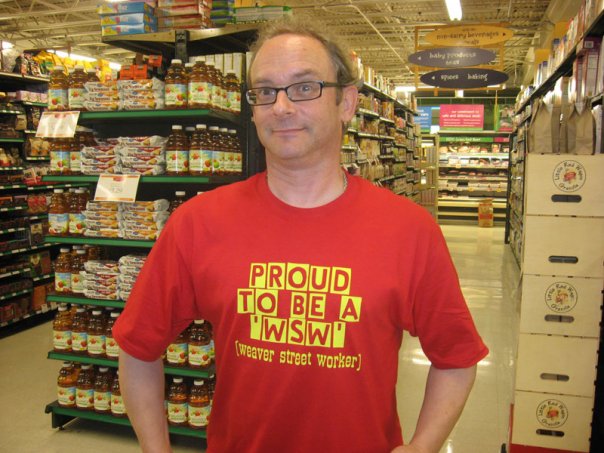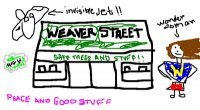 [Even by my standards, this is a long post! Perhaps, a tad repetitive. I don't apologize.
The challenges facing Weaver Street are intense and complex. There are important nuances to the 2008 Election for a Worker-Owner Director. And there are significant, if respectful, differences between the two Candidates.
I want to do proper justice to all of this. So, please bear with me. Take a coffee break in the middle, if you like! I'll even come around and do a half-time show, complete with 'wardrobe malfunction'!
[Even by my standards, this is a long post! Perhaps, a tad repetitive. I don't apologize.
The challenges facing Weaver Street are intense and complex. There are important nuances to the 2008 Election for a Worker-Owner Director. And there are significant, if respectful, differences between the two Candidates.
I want to do proper justice to all of this. So, please bear with me. Take a coffee break in the middle, if you like! I'll even come around and do a half-time show, complete with 'wardrobe malfunction'!
In the meantime, I've made it easier by breaking it down into three sections. The first covers the general points. The second goes into more detail about the Board's responsibility to we Worker-Owners. And the third deals with actually making The Decision, including information about the Candidate Forums.]
Don't think of the 2008
Election for a Worker-Owner Board Director as a popularity contest; nor as a contest between stores and locations -
[Espanol].
It's not. In reality, it's a Referendum. Nothing to do with personalities, or which location we come from. Quite simply a Referendum on the following question:
'Do you think that the current Board of Directors, with Jacob as its Chair, is protecting our interests as Worker-Owners - whichever location we come from?'
Now, is it fair for me to say that? Well, the fact is that Jacob has been
Chair of the Board these past three years. And the primary responsibility of the Board is to protect the interests of its Owners - including we Worker-Owners.
That said, this Board Election is not about personalities. It's not about locations. It's about issues. And who you think can best represent you - and your store, or location - on those issues.
I've
worked with Jacob. I like him. We're both nice guys. We both care. We both want to do the
best we can for The Weave. That much is clear from the Candidate Information you received in your mailbox, and which is up on the Weaver web-site.
What is not clear from that Information is that Jacob and I disagree fundamentally (but respectfully) on the important issues facing each and every unit within Weaver Street Market at the moment - and Weaver Street as a whole.
And those issues - the truly overwhelming ones - are the same for every unit and location in
WSM.
Jacob and I disagree fundamentally on the state of our co-op as it is. We disagree about where we should be going. And we disagree about how we should be getting there.
Simply put, Jacob thinks we're on the right path, that
everything's pretty much
ok, and that he and the Board are doing a good job of looking after the interests of Workers and Worker-Owners - in all of the different units and locations.
Now, I believe we're a fabulous co-op, with 200 Workers and 100 Worker-Owners ready to pitch in at a moment's notice to ensure we do not fail. But I also think that The Weave has lost its way a bit. And that is the responsibility of our current Board of Directors. They took their eye off the ball. And that affects every unit and location in
WSM, exactly the same.
Our Board has allowed Weaver Street to become over-extended and over-indebted heading into what promises to be a severe recession. No-one blames the Board for not forecasting the recession - heck, no-one else did. But the Board now needs to undertake some creative financial
alterations so that
WSM can return to financial security and stability, and so that we can once again feel comfortable calling The Weave a fully 'authentic' and a fully 'sustainable'
co-op.
The problem is that, while I know the current Board truly means well, I simply do not think that, based on the evidence of their recent decisions and discussions, they possess the skill sets necessary both to recognize the complicated challenges facing Weaver Street, and then to come up with the necessary creative solutions - not on their own. And I honestly believe that is why we find ourselves where we are at the moment.
I also believe that, with my former experience in the profit and non-profit corporate world, I can bring a perspective to the Board which it currently lacks, and which will help us all steer a safe course through the immediate challenging times. And which will lead us back to a Board which fully protects the interests of its Workers and its Worker-Owners - in each and every one of our units, fully and equally.
And that's what this Worker-Owner Board Election is about. A clear-cut choice between two fundamentally different approaches. Summed up by your answer to the question: Do you think that the current
WSM Board of Directors, with Jacob as its Chair, is
protecting our interests as Worker-Owners - whichever location we come from?
*******
[Right. That wasn't too bad. Now for the detail about whether or not the Board has been looking after our interests.
Gets a bit repetitive here. Hmm. What can I say? I feel passionately about the Board looking after us, and making The Weave the very best co-op it can be. And the strongest business.
Er. Is that a negative...?]
What do I mean by 'protecting our interests'? Well, try out your answers to the following questions:
Do you think our interests and those of our fellow Worker-Owners were being protected when the Board allowed our Dividend to be wiped out this year?
And make no mistake, our Board allowed it. They took a decision, backed by Jacob, in the middle of this year to remove the Board Policy requiring a profit of 1%. It was that Policy that protected our Dividend. And by removing it, the Board allowed a loss to be incurred.
Do you think our interests and those of our fellow Worker-Owners and Workers were being protected when the Board did indeed allow that loss - at some $400,000?
And our Board did allow it. They did not do a thorough enough job of monitoring what was going on, so as to prevent it.
I have to be honest - not negative, just straight - I'm not sure if they missed what was happening, or whether they simply didn't understand what they were seeing.
It's no shame to say you don't understand every financial detail of a $21 million turnover co-op - provided you're prepared to admit you could do with some help.
I know we're told that the loss was caused by one-off set-up costs occasioned by Expansion. But in all my years as a management consultant, I have never encountered a situation where such costs were included in operational expenditure, rather than capital depreciation. And I do understand the difference.
Plus, nowhere have we been offered a detailed breakdown of these set-up costs. And our Board has still not asked for one. All we are told is that there will be no such costs next year, and in the future.
Again, my years of experience as a management consultant tell me that there will be continuing extra costs associated with Expansion, that were not there before Expansion, and which will not be off-set by an increase in earnings - not in the near future; not in this recession.
So, without wishing to be the harbinger of doom, I see no reason why the loss from this year will not be repeated in the immediate years to come - not without some financial alterations.
And I would suggest that we need a different Board to bring about those financial alterations, in a way that retains the benefits of Expansion, and in a manner that is not detrimental to we Workers and Worker-Owners.
Do you think our interests and those of our fellow Worker-Owners and Workers were being protected when the Board allowed the future of our co-op to be mortgaged for $10 million?
Our Board personally signed off on all of that debt. Can we honestly say we're building a co-op that will last when it's built on
debt? How is that
'sustainable'?
How can we hope to 'sustain' huge debt repayments that will rise to
$800,000 in 2011 and
$1.5 million in 2012?
Again, I know that we are told that the debt is occasioned by the plans for Expansion, which plans are supposed to secure our future. But tell me, how are we securing our future with a debt we can not afford to repay? Isn't that, in fact, mortgaging our future, and making us unsustainable?
Did our Board request that those presenting them with the plans for Expansion accompany them with detailed forecasts as to cost and debt? If not, how was this protecting our interests and those of our fellow Worker-Owners and Workers?
Do you think our interests and those of our fellow Worker-Owners and Workers were being protected when those plans for Expansion were approved by the Board without the Board even seeking our permission - with all of the consequences that followed?
Do you think that is how the Board of a genuinely 'authentic' and democratic co-op should behave, if it is truly looking out for the interests of its Worker-Owners and its Workers? Shouldn't we be more of a Listening Co-op?
Now, I say this having spoken with many of you who supported Expansion and the Food House. It is not the decisions themselves I believe we should be questioning, but the manner in which they are being made.
Think about it. We don't worry about those big decisions with which we agree. We don't query how they were made. But when a big decision is about to be made with which we don't agree, we want to know how we, as Worker-Owners and Workers, can have meaningful input.
The answer at the moment is we can't. So, try the question again. Whether or not you agreed with Expansion, don't you think we Worker-Owners and Workers should have been allowed to give our approval before the plans went ahead? Bearing in mind we are now paying the cost, with a lost Dividend, and huge repayments of interest?
I have already made several
proposals for improving the internal mechanisms for consulting Workers and Worker-Owners. For making us more of a Listening Co-op. Not least an Online Forum (two Consumer-Owners and I are currently putting together a test one). But it requires the right Board of Directors to implement these proposals.
I do not necessarily disagree that the concept of Expansion was an acceptable answer to several problems. For example, the cramped conditions suffered by our food production colleagues, when they struggled in
Carrboro. And the lack of suitable equipment for those same work colleagues.
I have seen the Food House and the Administration Offices. I am delighted for those of my colleagues and friends who are themselves delighted with their new facilities. With their honest belief that those new facilities allow them
better to support the rest of us and all of our consumers.
But the fact is that
WSM's Auditor is sufficiently concerned with their cost (that $10 million), and with the huge, untenable repayments, that he has 'suggested' that
WSM's Board now come up with an immediate and comprehensive plan to deal significantly with that debt. I know
Auditors. You do not lightly ignore or 're-interpret' their 'suggestions.'
Do you think it is in our interest and those of our fellow Worker-Owners and Workers to depend on the Board, that allowed us to get where we are, now to come up with the way out?
Don't you think it might be more sensible to have a newly-elected Board, one which we feel comfortable has the skill sets and experience necessary to protect our future?
A different Board, one that we can trust to take a completely fresh look at the situation, and come up with a solution that our co-op can afford. That we Worker-Owners can afford. That returns our co-op to profitability. That gives us back our Dividend. While at the same time protecting the interests of all of the Workers and Worker-Owners involved.
In a co-operative, no solution is any kind of acceptable solution if it ignores our Workers and Owners. It is people, not buildings nor inventory nor balance sheets nor awards, but people who are the core value of profit. And we should never forget that in our co-operative.
My own experience tells me that Weaver Street is more than capable of pulling through the immediate challenges.
I hate to borrow a phrase that has been totally corrupted at the national level, but the fundamentals of Weaver Street are strong.
We have $14 million in assets. Our debt burden, although way too large, at a total of $12 million, is covered by our assets.
The problem is the debt repayments. We need a Board that has the skill sets and experience necessary to understand how to come up expeditiously with a comprehensive plan to restructure that debt.
If you are in any doubt whether or not the current Board has those necessary skill sets and experience, then ask them how they intend to deal with the debt. Ask them at the Annual Meeting on October 19 (details on the Weaver web-site), or ask them in the various Candidate Forums (details later on in this post).
Personally, I believe it is possible to resolve the debt situation with some creative re-structuring. And most important, if done by the right Board, it can be done in a way that retains all the benefits of Expansion and the Food House, while dramatically reducing the price all we Workers and Worker-Owners - including all those in the Food House, the Administration Offices and the
Hillsborough store - are having to pay.
But, here's the bottom line: it must be done in a way that has the full support of all of the Workers and Worker-Owners involved. Never again in this co-op should major decisions be taken, that have such a dramatic affect on we Workers and Worker-Owners, without the full and express permission of we Workers and Worker-Owners. We need to be a truly Listening Co-op.
And again, if you are in any doubt whether or not our current Board will seek your approval, when they didn't seek it last time around, then ask them. All I can say is that any Board to which I am elected will ask your permission first.
For example, I will insist that those working in the
Carrboro store will have final say on any refurbishment changes that may be made to the
Carrboro store. I will insist that any new developments with the
Hillsborough store and the Food House will only proceed if they have the full support of all those working there. Will the current Board and its Chair make you the same pledge?
I know all this consultation takes time, and may be viewed by some as an irritating intrusion on their normal decision-making processes. But, I feel that, in a co-op, we should be able to find the time, and we should always put people first.
Now, if after all this explanation, you are still happy with where we are and where we are going. If you genuinely believe that the Board which got us where we are is the same Board that can get us out of that situation. If you truly believe that they possess all of the necessary skill sets and experience. And that they will protect the future interests of
WSM as a whole - and of your location. If you believe all of that. Then stick with the Board we have. And I would respectfully suggest that you will continue to get more of what's been going wrong.
More of the same.
If, however, you believe there is room for something different. If you believe there is room for new skills sets on the Board. And if you believe that something different - those new skill sets - can make all of Weaver Street a better co-op and a stronger business (with each of the individual units and locations becoming better and stronger in their own individual ways), then maybe you should think about choosing
something different?
That's what this Board Election is about. Not personalities. Not individual units and locations. Isolated and inward-looking. But the co-op as a whole. Newly empowered. Acting as one. Ready to
overcome all challenges.
*******
[Ok. Now's about the time you might want a back-rub and a cup of hot chocolate - or maybe something stronger. But complex situations require complex thoughts and processes.
Onto the last section - where I try to set out the factors that might help you make The Big Decision...or not...]Now it's very easy just to say that. But I know it's a lot more difficult to keep it in mind when you're sat there with your pen poised over the Ballot Paper.
You may well be thinking:
geez, why does anyone have to 'lose'? Jacob has qualities. Geoff does, too. Jacob wants to go on serving. And Geoff thinks he has something to add. What to do?
All I can suggest is this: same point, from a different angle. Jacob and I are big boys now. We're grown-up. We knew when we submitted our names that one of us was going to lose. That was our choice, not yours. You have no reason to feel guilt.
Focus on the one thing that is yours: your choice about where you want Weaver Street to go. Do you think everything is
ok? Or do you think we need something a tad different?
Make your choice an honest one, based on an honest appraisal of where we are. And I can promise you that neither Jacob nor I will be offended by your choice.
We have an honest difference of opinion. We welcome your verdict. It's not about us. It's about you. It's that simple. Honest!
Another point I want to clear up. One or two of you, when speaking with me, have wondered at the fact that all of our Worker-Owner Directors come from the
Carrboro store, when we now have five locations, spread over three towns.
[We are entitled to a total of two Worker-Owner Directors on the Board, each serving two-year terms, elected in staggered years: Lori Washington (
Carrboro: Front End) was elected last year, and will serve until the end of 2009; and Jacob (
Carrboro: Kitchen) is standing this year.]
I say: absolutely and totally irrelevant. If you genuinely believe that Jacob represents you best on all of the issues, then you vote for him regardless of which unit he comes from. Same goes for me.
Jacob and I are both of us pledged to represent and act for all Worker-Owners equally. This is not some power-play between locations. It's about what's best for all Worker-Owners in The Weave. Jacob and I are agreed on that absolutely.
Ok?
And on that last point, when you do finally make your choice, remember that you are choosing for all the Workers around you, too. Your colleagues. Your friends. Both at your own location, and in all the other locations. We are one co-op.
Now, if you're not sure about the answer to this 'Referendum,' then you have the opportunity to ask questions of Jacob and me at a series of Candidate Forums.
To ask Jacob why he thinks we're on the right course. And to ask me what sort of different and more
successful path I think we could follow. [By the way, I'm also happy for you to write to me at:
geoffgilson@hotmail.com.]
A separate Forum will be held in each of the Weaver units. Managers have agreed to make it possible for Workers (not just Worker-Owners) to attend. The dates and times are as follows:
The Food House Break Room (also for everyone in the Administration Offices)
Tuesday, October 21, 10:30am-11:30am
Hillsborough Store Break Room
Tuesday, October 21, 12:00pm (noon)-1:00pm
Carrboro Store Break Room (also for our fellow work-mates at
Panzanella)
Thursday, October 23, 11:00am-12:00pm (noon)
Southern Village Store Break Room
Thursday, October 23, 12:30pm-1:30pm
Don't fret if you're not free to attend the Forum in your unit. You can attend any Forum you choose. And maybe you'd like to hold off voting until you've had a chance to chat with your Candidates?
Voting begins on October 6. The end-point for voting is Sunday, November 2, @ 9.00pm.
Every Worker who has been with Weaver Street for at least 6 months has the opportunity to vote in this Board Election. But first, you must become a Worker-Owner.
You can become a Worker-Owner up to October 25, and still take part in this year's Board Election.
If you want to vote, speak with your Manager, or speak with Linda or Jason in Marketing. They will tell you how to become a Worker-Owner, and how to vote. Or e-mail
board@weaverstreetmarket.coop.
At the end of the day, this Board Election is about you. You have the power to choose whatever future you want for The Weave.
And I'm sure there's one thing that Jacob and I do agree upon. That is, please vote! Whichever way you vote, please vote!
You have an opportunity that many people in the world do not possess, so please make use of it. And thank you for bearing with me...all the way to the end!
[I want to take this opportunity sincerely to thank Eliza, Ruffin, Linda, David, Diane, Mickey-Jo and Emily (the WSM Elections Oversight Committee), everyone in WSM Marketing, and the Managers of all the WSM units, for all the endless hours they have put in, along with all the creative brainstorming, and their co-operative spirit, to make this Worker-Owner Election happen in such an open and inclusive fashion. This is my personal spiff to you all!]
 Something tells me that, in the coming months, we @ The Weave are going to be told by senior management that we should be happy with what is happening (or not happening) in our co-op because "we're doing better than..."
Something tells me that, in the coming months, we @ The Weave are going to be told by senior management that we should be happy with what is happening (or not happening) in our co-op because "we're doing better than..."
































